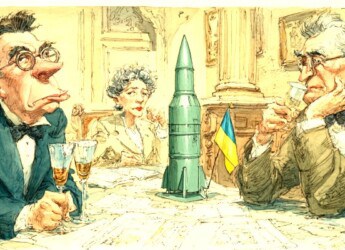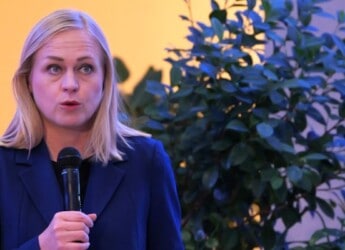|
|
Content Assessment: Returning to the Scene of the Crime? Russo-Ukrainian War Update (March 14 - 20, 2023)
Information - 92%
Insight - 93%
Relevance - 95%
Objectivity - 93%
Authority - 96%
94%
Excellent
A short percentage-based assessment of the qualitative benefit of the post highlighting the recent Ukraine conflict assessments in maps from the Institute for the Study of War.
Editor’s Note: The discipline of eDiscovery, which involves the identification, preservation, and analysis of electronic data, is increasingly being used in investigations and litigation relating to war crimes. In the case of the Russo-Ukrainian War, eDiscovery tools and techniques can be used to identify and collect electronic evidence of war crimes, such as emails, social media posts, and other digital communications that may provide valuable insights into the actions of individuals and organizations involved in the conflict. This evidence can then be used in investigations and legal proceedings to hold perpetrators of war crimes accountable for their actions. Additionally, eDiscovery can help to efficiently and effectively manage the vast amount of electronic evidence that may be relevant to war crimes cases, allowing investigators and legal teams to quickly and accurately analyze the data to identify key pieces of information. This weekly update may be useful for cybersecurity, information governance, and legal discovery professionals as they consider investigations and litigation resulting from war crimes committed during the war.
Background Note: One of the most accurate and detailed sources for ongoing updates on the Ukraine crisis is the Russian Offensive Campaign Assessment from the Institute for the Study of War. The Institute for the Study of War (ISW) is a 501(c)(3) organization and produces strictly non-partisan, non-ideological, fact-based research. ISW seeks to promote an informed understanding of war and military affairs through comprehensive, independent, and accessible open-source research and analysis. ISW’s research is made available to the general public, military practitioners, policymakers, and media members. Providing a daily synthesis of key events related to the Russian aggression against Ukraine, ISW updates may benefit investigators and litigators as they follow the business, information technology, and legal trends and trajectories impacted by and stemming from the current Russo-Ukrainian conflict.
Assessment and Maps*
Russo-Ukrainian Conflict Assessments – An Overview in Maps
- Institute for the Study of War (ISW), Russia Team
- Critical Threats Project (CTP), American Enterprise Institute
General Assessment Background Info
- ISW systematically publishes Russian campaign assessments that include maps highlighting the assessed control of terrain in Ukraine and main Russian maneuver axes.
- These maps augment daily synthetic products that cover key events related to renewed Russian aggression against Ukraine.
The Russian Offensive Campaign Assessments
- March 20, 2023
- By Riley Bailey, Angela Howard, Karolina Hird, Nicole Wolkov, Layne Philipson, George Barros, and Frederick W. Kagan
Key Development
- Chinese President Xi Jinping met with Russian President Vladimir Putin in Moscow on March 20 and offered a more reserved vision for Russian-Chinese relations than what Putin was likely seeking.
Key Takeaways
- Putin is likely increasing his attempts to rally the rest of the world against the West, although it remains unlikely that he will achieve decisive effects in this effort.
- Wagner Group Financier Yevgeny Prigozhin appears to maintain powerful political leverage and regional connections despite some officials’ attempts to distance themselves. Russian authorities are likely unsure of how to redefine Wagner’s new role following Prigozhin’s overextension of Wagner resources and support.
- The Russian information space continues to respond to the International Criminal Court (ICC)’s issuance of arrest warrants for Russian President Vladimir Putin and Russian Commissioner on Children’s Rights Maria Lvova-Belova with ire and anxiety.
- Ukrainian Main Intelligence Directorate (GUR) Spokesperson Andriy Yusov stated that the frequency of large Russian missile attacks has decreased.
- Russia requested that the UN Security Council discuss Israeli airstrikes in Syria possibly in retaliation for Israel’s approval of export licenses for anti-drone jamming systems for Ukraine.
- Russian sources claimed that Ukrainian and Russian forces conducted offensive operations northeast of Kupyansk.
- Russian forces continued offensive operations near Svatove and Kreminna.
- Russian forces continued making advances in and around Bakhmut.
- Russian forces continued ground attacks along the Avdiivka-Donetsk City frontline and made marginal gains near Avdiivka.
- Russian sources claim that Russian forces are building up defensive fortifications and repelled Ukrainian reconnaissance-in-force operations in Zaporizhia Oblast.
- Russian sources accused unknown actors of planting a bomb that exploded near a gas pipeline in occupied Simferopol, Crimea.
- Russian President Vladimir Putin acknowledged Russian difficulties obtaining components for high-tech industrial production.
- Ukrainian partisans killed Russian-appointed head of the Kherson Oblast pre-detention center Serhii Moskalenko with an improvised explosive device on March 17.
- March 19, 2023
- By Karolina Hird, Grace Mappes, Riley Bailey, Kateryna Stepanenko, and Frederick W. Kagan
Key Development
- Statements made by Ukrainian military officials on the pace and prospects of current Russian offensive operations may suggest that the overall Russian spring offensive may be nearing culmination.
Key Takeaways
- Ukrainian forces likely conducted a localized counterattack southwest of Bakhmut amid growing Russian discussion about a potential Ukrainian counteroffensive in the Bakhmut area.
- The overall Russian spring offensive is thus likely approaching culmination.
- Russian President Vladimir Putin visited occupied Mariupol on March 19, likely to project the image of invulnerability and to continue efforts to portray himself as an involved wartime leader.
- Putin’s Mariupol visit likely also aimed to assuage a longstanding and pervasive fear in the nationalist space about a prospective Ukrainian counteroffensive in southern Ukraine.
- Former Russian officer, convicted war criminal, and prominent critical nationalist milblogger Igor Girkin indicated that there are likely deepening fractures within the top levels of Russian military leadership.
- March 18, 2023
- By Riley Bailey, Grace Mappes, Angela Howard, Kateryna Stepanenko, and Frederick W. Kagan
Key Development
- Russian President Vladimir Putin continued his campaign against anti-war dissent and the misappropriation of military assets within Russia.
Key Takeaways
- Russian forces targeted Ukraine with 16 Shahed-136 drones overnight on March 17-18.
- Wagner financier Yevgeny Prigozhin is likely attempting to set informational conditions for the Wagner Group’s culmination around Bakhmut.
- Russian regional authorities may be severing their connections with Prigozhin.
- Russian Foreign Ministry Spokesperson Maria Zakharova reiterated that the Kremlin has not abandoned its maximalist goals in Ukraine.
- BBC and Russian opposition news outlet Mediazona estimated that Russian forces have suffered at least 35,000 total deaths and 157,000 total casualties.
- Russian forces conducted limited ground attacks along the Kupyansk-Svatove-Kreminna line.
- Russian forces continued offensive operations in and around Bakhmut and on the outskirts of Donetsk City.
- Russian forces continue to erect defensive fortifications along ground lines of communication (GLOCs) in and near occupied Crimea.
- Conventional Russian authorities and the Wagner Group continue to invest significant resources in efforts to involve youth in the war effort and ready them mentally and physically for military service.
- Russian occupation authorities continue efforts russify Ukrainians in occupied territories.
- March 17, 2023
- By Riley Bailey, Kateryna Stepanenko, Grace Mappes, George Barros, Layne Philipson, and Frederick W. Kagan
Key Development
- Chinese President Xi Jinping will meet with Russian President Vladimir Putin during a state visit to Russia from March 20 to 22 likely to discuss sanctions evasion schemes and Chinese interest in mediating a negotiated settlement to the war in Ukraine.
Key Takeaways
- Belarusian President Alexander Lukashenko confirmed that Belarusian industry is supplying Russia electronic components, potentially supporting previous ISW assessments that Belarus may assist Russia to evade Western sanctions.
- Serbian President Aleksandar Vucic’s rhetoric about Belgrade’s refusal to sanction Russia is softening.
- The International Criminal Court issued an arrest warrant for Russian President Vladimir Putin and Russian Commissioner on Children’s Rights Maria Lvova-Belova on March 17 for alleged war crimes involving the deportation of Ukrainian children to Russia.
- Russian outlet Nezavisimaya Gazeta reported that it did not submit a press request to Wagner Group financier Yevgeny Prigozhin concerning a rumored plot by Russian President Vladimir Putin and Russian Security Council Secretary Nikolai Patrushev against him.
- Russian forces conducted limited ground attacks across the Kupyansk-Svatove-Kreminna line.
- Russian forces continued offensive operations in and around Bakhmut.
- Russian forces continued offensive operations along the outskirts of Donetsk City.
- Russian sources claimed that Russian forces repelled Ukrainian forces along the front line in southern Ukraine.
- The Kremlin continues to call up reservists throughout Russia.
- Russian authorities reportedly detained three Ukrainian partisans in occupied Zaporizhia Oblast.
- March 16, 2023
- By Karolina Hird, Riley Bailey, Angela Howard, George Barros, Nicole Wolkov, Layne Philipson, and Frederick W. Kagan
Key Development
- The Russian Federal State Security Service (FSB) appears to be trying to penetrate the Russian Defense Industrial Base (DIB) in a way that is reminiscent of the KGB’s involvement with the Soviet military establishment.
Key Takeaways
- Wagner Group financier Yevgeny Prigozhin claimed that he received a press question exposing a plot spearheaded by Russian President Vladimir Putin and Russian Security Council Secretary Nikolai Patrushev to undermine and “neutralize” the Wagner Group.
- Western news agencies confirmed that Chinese companies have sold military and dual-use equipment to unidentified Russian entities. These sales appear small in scale but could alleviate strain on Russia’s defense industrial base (DIB) and circumvent Western attempts to limit Russian access to microchips.
- Syrian President Bashar Assad used a staged interview with Russian outlet RIA Novosti to amplify notable Russian information operations.
- Polish President Andrzej Duda stated that Poland will give Ukraine four MiG-29 fighter jets.
- Russian’s decision to redeploy elements of its “peacekeeping force” from Nagorno-Karabakh to Ukraine is eroding Russia’s influence with Armenia.
- Russian President Vladimir Putin attempted to reassure the Russian public that the war in Ukraine will not have significant long term economic consequences, likely as part of the Kremlin’s effort to prepare Russians for a protracted war.
- Russian forces conducted limited ground attacks northeast of Kupyansk and along the Svatove-Kreminna line.
- Russian forces continued advancing in and around Bakhmut and continued ground attacks along the Avdiivka–Donetsk City line and in Western Donetsk Oblast.
- Russian sources claimed that Ukrainian forces conducted localized assaults in Zaporizhia Oblast.
- Ukrainian sources reported that Russian forces increased their naval presence in the Black Sea.
- March 15, 2023
- By Karolina Hird, Kateryna Stepanenko, Grace Mappes, Nicole Wolkov, Layne Philipson, Zachary Coles, and Frederick W. Kagan
Key Development
- The overall pace of Russian operations in Ukraine appears to have decreased compared to previous weeks.
Key Takeaways
- The overall Wagner Group offensive on Bakhmut appears to be nearing culmination.
- International journalists reportedly obtained the Kremlin’s long-term strategy document for destabilizing and reintegrating Moldova back into the Russian sphere of influence by 2030.
- Wagner Group financier Yevgeny Prigozhin commented on the reports about the dismissal of the Russian Commander of the Airborne Forces Mikhail Teplinsky – likely revealing Teplinsky’s affiliation with Wagner.
- The Russian State Duma adopted the law on punishment for “discreditation” of all participants of the “special military operation” in Ukraine on March 14 to foster self-censorship in Russian society.
- Continued Russian efforts to portray the war in Ukraine as existential to Russian domestic security by establishing additional air defense installations in areas that will never see hostilities is reportedly sparking internal backlash.
- Russian President Vladimir Putin used his March 15 meeting with the Russian Prosecutor General’s Office to continue to bolster his reputation as an involved and effective wartime leader.
- Russian President Vladimir Putin met with Syrian President Bashar al Assad in Moscow, Russia on March 15.
- Russian forces did not conduct any confirmed ground attacks northwest of Svatove and conducted limited ground attacks on the Svatove-Kreminna line.
- Russian forces continued advancing in and around Bakhmut and conducted ground attacks along the Avdiivka-Donetsk City line.
- A Russian milblogger claimed that Ukrainian forces attempted to conduct offensive actions across the Kakhovka Reservoir in Kherson Oblast.
- The Kremlin reportedly tasked the Russian Ministry of Defense (MoD) to recruit 400,000 contract servicemen starting on April 1.
- Ukrainian partisans killed a Russian collaborator in an IED attack in Melitopol, Zaporizhia Oblast.
- March 14, 2023
- By Karolina Hird, Grace Mappes, George Barros, Nicole Wolkov, and Frederick W. Kagan
Key Development
- Russian authorities continue measures to mobilize the struggling Russian defense industrial base (DIB) for a protracted war effort, including measures that will force the Kremlin to choose between having skilled workers in the DIB and skilled military personnel fighting in Ukraine.
Key Takeaways
- Prominent Russian milbloggers are reamplifying a longstanding Russian information operation that seeks to weaponize religion to discredit Ukraine.
- Russian Su-27 jets forced down a US MQ-9 Reaper drone over the Black Sea in international airspace.
- Polish Prime Minister Mateusz Morawiecki stated on March 14 that Poland could supply MiG-29 multirole fighters to Ukraine within four-to-six weeks.
- Ukrainian sources reported that Russian forces continue building defenses along Russia’s border with Ukraine in order to pin Ukrainian troops to northern border areas.
- Russian forces conducted limited ground attacks northeast of Kupyansk and along the Svatove-Kreminna line.
- Russian forces advanced within Bakhmut and continued ground attacks along the Avdiivka–Donetsk City frontline and in western Donetsk Oblast.
- Russian forces continue fortifying rear areas in Russian occupied Zaporizhia Oblast.
- United Russia Secretary Andrey Turchak announced on March 14 that the Russian State Duma will consider a law simplifying the legal recognition of missing Russian soldiers as dead.
- Ukrainian partisans injured the Deputy Head of the Nova Kakhovka Occupation Military Administration in an improvised explosive device (IED) attack.
We do not report in detail on Russian war crimes because those activities are well-covered in Western media and do not directly affect the military operations we are assessing and forecasting. We will continue to evaluate and report on the effects of these criminal activities on the Ukrainian military and population and specifically on combat in Ukrainian urban areas. We utterly condemn these Russian violations of the laws of armed conflict, Geneva Conventions, and humanity even though we do not describe them in these reports.
Chronology of Maps from March 14-20, 2023 – Mouseover to Scroll
Ukraine Conflict Maps - 031423 - 032023See the Institute for the Study of War Interactive Map of the Russian Invasion
Read the latest Ukraine Conflict updates from the Institute for the Study of War
* Shared with direct express permission from the Institute for the Study of War (ISW).
About the Institute for the Study of War Research Methodology
ISW’s research methodology relies on both primary and secondary sources, enabling researchers to develop a comprehensive understanding of the situation on the ground. In order to analyze military and political developments in any given area, ISW’s research analysts must wholly understand the systems of enemy and friendly forces. They must also understand the population demographics, physical terrain, politics, and history of that area. This lays the analytical foundation for understanding the reasons for particular developments and fulfilling their assigned research objectives. ISW analysts also spend time in places like Iraq, Afghanistan, and elsewhere in order to gain a better understanding of the security and political situation and to evaluate the implementation of current strategies and policies. Our researchers compile data and analyze trends, producing a granular analysis of developments in areas of research, producing an accurate, high-resolution, timely, and thorough picture of the situation. ISW’s research methodology guarantees its success and commitment to improving the nation’s ability to execute military operations, achieve strategic objectives, and respond to emerging problems that may require the use of American military power.
About the Institute for the Study of War
The Institute for the Study of War advances an informed understanding of military affairs through reliable research, trusted analysis, and innovative education. We are committed to improving the nation’s ability to execute military operations and respond to emerging threats in order to achieve U.S. strategic objectives. ISW is a non-partisan, non-profit, public policy research organization.
Learn more, get involved, and contribute today.
Additional Reading
- From Dissent to OSINT? Understanding, Influencing, and Protecting Roles, Reputation, and Revenue
- [Annual Update] International Cyber Law in Practice: Interactive Toolkit
- Data Embassies: Sovereignty, Security, and Continuity for Nation-States
Source: ComplexDiscovery



























